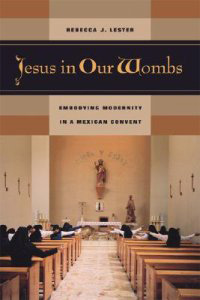 |
 |
 |
 Entertainment | Books | August 2006 Entertainment | Books | August 2006  
Author: Mexican Nuns have Thirst for Social Justice
 McClatchy-Tribune News Service McClatchy-Tribune News Service


| | An associate professor of anthropology spends 18 months at a convent studying what motivates women to leave comfortable lives for the hardship of entering a religious order. |
At a time when American religious orders report smaller and smaller classes of young women, one researcher says a convent in Central Mexico has tripled the number of new nuns largely because of its commitment to social justice.

The women willingly undertake a rigorous life of rising before dawn, cold-water showers, hours of prayer, and silent meditation, said Rebecca J. Lester, author of “Jesus in Our Wombs: Embodying Modernity in a Mexican Convent.”

“Each year scores of young women more and more each year are leaving the warmth and protection of their homes,” she wrote, “leaving their friends, their families, their high schools and universities, to march through the convent door, where they will surrender themselves body and soul to Christ for eternity.”

Lester, an assistant professor of anthropology at Washington University in St. Louis, Mo., spent 18 months in Puebla, Mexico, in the mid-1990s, studying postulants women who wanted to become nuns. In 15 years, the convent she studied tripled the number of postulants.

“The majority of them are women who have other opportunities,” she said, but instead pledge themselves to spirituality and working against economic exploitation and political corruption.

“For women who are committed to social justice, who want to be able to involve themselves socially and politically, while at the same time holding on to traditional family values,” she said, “this is a way for them to do that.”

Dorothy Donnelly, a former member of the Sisters of Saint Joseph and author of “Radical Love,” is not surprised by the success of the Mexican order, and she agrees with Lester that it is an expression of feminism.

“Joining a group like that, that is definitely what we call ‘a word spoken,'” said Donnelly. “They use their power to choose to speak a word in the culture and to the culture about their values.”

Some Florida nuns recall that in the 1960s, their convents had equally large classes of postulants, and the routine was equally rigorous.

“The day I entered I thought that would be my life for the rest of my life,” recalled Sister Rosemary Finnegan of St. Margaret Mary Catholic Church in Winter Park, Fla., and a member of the Dominican order. “The transition was dramatic. You were trying to learn what this life was going to be like for you.”

Sister Elizabeth Murphy, principal of St. John Vianney Catholic School in Orlando, Fla., recalled a similar feeling during her early training, part in her native Ireland and part in Philadelphia, when she joined the Sisters of Saint Francis.

“Sometimes I felt we were in boot camp,” she said. “But I believed that no matter what, this was what God was calling me to do.”

“You had that zeal,” she said. “You said to yourself, ‘No matter what, I'm going to stick this thing out ... This is what was what I was called to be: a sister.'” | 
 | |
 |



